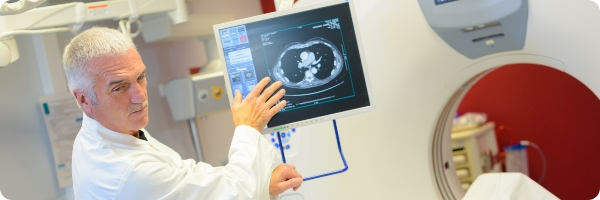In the UK, prostate cancer is the most common type of cancer in men, with more than 52,000 new cases diagnosed every year on average. This cancer occurs in the prostate, which is a small, walnut-shaped gland that produces seminal fluid – which both nourishes and transports sperm. Prostate cancer cells generally grow slowly, and can be confined to the prostate gland. While the cancer stays confined within the prostate, it rarely causes harm. In these cases, no intervention is needed, just careful monitoring of the situation. However, other types of prostate cancer can be more aggressive and spread quickly.
When prostate cancer is caught in its early stages (usually when it’s confined to the prostate gland), it’s possible to treat and control the disease – without shortening life expectancy.

Who has a prostate?
The following people have a prostate, and are therefore at risk of developing prostate cancer:
- Men who were assigned male at birth, and continue to identify as men.
- Trans women: someone who was assigned male at birth but now identifies as a woman. Trans women can develop prostate problems, even if they have taken hormones. The prostate is not removed during genital reconstructive surgery.
- Non-binary people who were assigned male at birth.
- Some intersex people. An intersex person may have both male and female sexual characteristics, and so might have a prostate.
What causes prostate cancer?
The exact cause for prostate cancer is unknown. However, there are certain factors that might increase your risk of developing it:
Prostate cancer risk factors
It’s not clear why it occurs, but the risk of developing prostate cancer is also increased depending on your:
- Age: Your chances of developing prostate cancer increase as you get older. The condition mainly affects men over 65, although men over 50 are also at increased risk.
- Ethnic group: Statistics show that black men are 2-3 times more likely to develop prostate cancer than their white counterparts, and are more likely to develop prostate cancer at a younger age.
- Family history: You are two and a half times more likely to get prostate cancer if your father or brother has had it, compared to someone who has no relatives with prostate cancer. Your risk of getting prostate cancer may also be higher if your mother or sister has had breast cancer.
- Obesity: Research suggests that there’s a connection between obesity and prostate cancer. Eating a balanced diet and regular exercise can lower your risk of developing prostate cancer.
- Diet: There is some evidence that a high calcium diet (of >2000 mg/d) may increase the risk of developing prostate cancer. However, research in this area is still ongoing, and a strong link has yet to be made.

How to avoid prostate cancer
Although there’s no definite way to prevent prostate cancer, there are certain things you can do to reduce your risk of developing it. This includes the following:
- Eating a healthy diet: Studies have suggested that eating a lot of tomatoes is associated with a reduction in risk of prostate cancer. Tomatoes cooked in oil seem to have a more protective effect, so the Mediterranean diet seems to be most suitable. Following a balanced and healthy diet – full of fruit and veg – is the best method.
- Maintaining a healthy weight: Men who have a body mass index (BMI) of 30 or higher might have a heightened risk of developing prostate cancer. You can lose weight by avoiding sugar and foods that the body treats as sugar, such as refined carbohydrates (e.g. white rice and white pasta) and building metabolic tissue in the form of muscle through exercise.
- Exercising regularly: Some studies suggest that exercising most days of the week can reduce your chance of developing prostate cancer. Exercise can help you to maintain a healthy weight, and it can also lower your risk of developing heart disease, alongside preventing other types of cancer.
- Speaking to your doctor about your risk: If you have a higher risk of developing prostate cancer, it’s important that you discuss this with your doctor. By targeting the disease early, it can be easier to treat.
What are the symptoms of prostate cancer?
- Needing to pee more frequently, often during the night
- Needing to rush to the toilet
- Difficulty in starting to pee (hesitancy)
- Straining or taking a long time while peeing
- Weak flow of urine
- Feeling that your bladder has not fully emptied
- Blood in urine
- Blood in semen
- Prostate cancer can also have no symptoms, especially in its early stage
You should see your GP if you notice any symptoms, or you are worried about the possibility of prostate cancer. Symptoms are much more likely to be prostate enlargement, but it’s essential to rule out cancer.
How is prostate cancer diagnosed?

If you display any symptoms that are associated with prostate cancer, you should book a doctor’s appointment as soon as you can. Although there’s no conclusive test for prostate cancer, the following is likely to give the GP a good idea of whether the symptoms are caused by cancer:
- Ask for a urine sample: This will be done to check for signs of infection.
- Perform a digital rectal examination: Your doctor will insert a gloved finger into your bottom to examine your prostate.
- Perform a PSA test: Your doctor will take a blood sample to test your level of prostate-specific antigen (PSA).
If your doctor believes that you may be at risk of developing prostate cancer, they’ll refer you to a hospital for further tests. Most men have non-cancerous enlargement of their prostate. Read more about that here.
- Surgery. The prostate is surgically removed usually used when the cancer has not spread. It can carry risks.
- Radiotherapy. This uses radiation to kill cancerous cells and is usually offered when the cancer has not spread beyond the prostate. Sometimes hormone therapy is given before or after radiotherapy to increase its effectiveness.
- Brachytherapy. Also known as internal radiotherapy, this form of treatment is delivered directly inside the prostate
- New treatments. Newer treatments include high-intensity focused ultrasound (HIFU). Here an ultrasound probe inserted into the rectum releases sound waves that kill cancer cells in the prostate gland by heating them to a high temperature. Cryotherapy is another new treatment. Tiny needles inserted into the prostate gland deliver a treatment that freezes and kills cancer cells. Whilst these are promising potential treatments, they have not yet been shown to be effective in the long term for all patients and therefore patients undergoing these treatments should expect be entered into clinical trials.
Can you check for prostate cancer yourself?
Other than ordering an at-home PSA blood test, there’s no accurate way to check for prostate cancer yourself at home. If you think you’re at risk of developing prostate cancer, or you’re displaying symptoms associated with it, book an appointment with your GP as soon as you can.
There is no national screening programme for prostate cancer in the UK, as there isn’t a reliable test that can pick it up in the early stages when treatment is most effective. Overall, research has shown that current tests don’t reduce the number of men dying from prostate cancer. Research is underway to find a new test, or to see if the current test is more effective if used in a different way, and can find cancers that need treatment more accurately. There may a good reason to screen for prostate cancer in people who have a high risk, for instance older African-Caribbean men.
Prostate cancer treatment
The outlook for prostate cancer is generally good because, unlike many other types of cancer, it usually progresses very slowly. Many men die with prostate cancer, rather than as a result of it.
If the prostate cancer is at an early stage and not causing symptoms, your doctor may suggest actively monitoring it with blood tests. They may also recommend MRI scans or biopsies, offering treatment if there are signs that the cancer is growing faster. In elderly men, a policy of regular PSA and symptomatic monitoring may be appropriate. Some cases of prostate cancer can be cured if treated in the early stages.
The best option depends on your choice, age and overall health.
You can read more about the treatments offered by the NHS here. However, they include:
- Surgery: The prostate is surgically removed, usually used when the cancer has not spread. It can carry risks.
- Radiotherapy: This uses radiation to kill cancerous cells and is usually offered when the cancer has not spread beyond the prostate. Sometimes hormone therapy is given before or after radiotherapy to increase its effectiveness.
- Brachytherapy: Also known as internal radiotherapy, this form of treatment is delivered directly inside the prostate.
- New treatments: Newer treatments include high-intensity focused ultrasound (HIFU). This involves an ultrasound probe being inserted into the rectum, and it releases sound waves that kill cancer cells in the prostate gland by heating them to a high temperature. Cryotherapy is another new treatment. Tiny needles inserted into the prostate gland deliver a treatment that freezes and kills cancer cells. Whilst these are promising potential treatments, they have not yet been shown to be effective in the long term for all patients. Therefore, patients undergoing these treatments should expect to be entered into clinical trials.
Some cases are only diagnosed at a later stage, when the cancer has spread. If the cancer spreads to other parts of the body and cannot be cured, treatment is focused on prolonging life and relieving symptoms. There are now many treatment options for patients in this situation, including hormone treatments, chemotherapy, radiotherapy, newer hormonal treatments and newer classes of cancer drugs. This is a rapidly evolving field and patients may be offered the chance to take part in clinical trials of these newer treatments.
Treatment side effects
The potential side effects of prostate cancer treatment include:
- Erection problems: If you have erectile dysfunction as a result of treatment, speak to your GP. It may be possible to treat you with sildenafil (Viagra), which increases the blood supply to your penis. Other medicines are available if sildenafil is not effective. An alternative is a device called a vacuum pump. You place your penis in the tube and then pump out all the air. This creates a vacuum, which causes the blood to rush to your penis. You then place a rubber ring around the base of your penis to keep the blood in place, allowing you to maintain an erection. There are also nutrition and lifestyle interventions that can too, such as eating a diet with plenty of nitric oxide – which is a vasodilator. Foods rich in nitric oxide include: beets, garlic, dark chocolate, leafy greens, and citrus fruits.
- Urinary incontinence symptoms: If your symptoms are mild, you may be able to control them by learning some simple exercises. Pelvic floor or Kegel exercises can strengthen your control over your bladder. Find more about them here. If your urinary incontinence is more severe, it may be possible to treat it with surgery. This might involve implanting a male urethral sling, or an artificial sphincter – the sphincter is the muscle used to control the bladder outlet.
Living with prostate cancer
As prostate cancer usually progresses very slowly, you can lead a long life without showing symptoms or needing treatment.
However, if your prostate cancer progresses, you may not feel well enough to do all the things you used to. After an operation or other treatment, you’ll probably feel tired and need time to recover. And as well as the possible side effects of treatment, your diagnosis may make you feel anxious or depressed. It may be helpful to talk about the condition with your family, friends, a family doctor, and other individuals with prostate cancer. Many hospitals have specialist nurses who can help you through these stages. They sometimes offer complementary therapies such as acupuncture. And there is a network of hospices which offer a wide range of palliative care. The links below have useful information about where to find more support.
Get support
If you’ve been diagnosed with prostate cancer, there are various resources available that provide valuable advice and support. You may find the following useful:
- NHS: Living with Prostate cancer
- Cancer Research UK: coping with prostate cancer
- Prostate Cancer UK: guide on how to manage fatigue
- Prostate Cancer UK: sex and prostate cancer
- Prostate Cancer UK: urinary problems and prostate cancer
- Prostate Cancer UK: guide on how to manage urinary problems
To understand your current prostate health better, and how to protect it, you can fill out the Prostate Check questionnaire within the Evergreen Life app.
Not got the app yet? Download the Evergreen Life app by tapping the button below and look out for a notification about your Prostate Check questionnaire*.
*Must be 18 or over and male to receive the Prostate Health Check. If you haven’t told us your age and sex, please first take the GP Check in your Records section.
Reviewed by:
Anna Keeble – Head of Content
- Chen K, Pittman RN, Popel AS. Nitric oxide in the vasculature: where does it come from and where does it go? A quantitative perspective. Antioxid Redox Signal. 2008 Jul;10(7):1185-98. doi: 10.1089/ars.2007.1959. PMID: 18331202; PMCID: PMC2932548.
- Chinegwundoh, F (2018) Time to talk about the prostate cancer risk in black men and what we can do about it. NHS England
- Mayo Clinic (2022) Prostate cancer. Mayo Clinic
- Mayo Clinic (2022) Prostate cancer prevention: Ways to reduce your risk. Mayo Clinic
- NHS UK (2022) Blood in semen. NHS UK
- NHS UK (2020) Blood in urine. NHS UK
- NHS UK (2021) Prostate cancer – causes. NHS UK
- NHS UK (2021) Prostate cancer – diagnosis. NHS UK
- NHS UK (2021) Prostate cancer – symptoms. NHS UK
- NHS UK (2021) Prostate cancer – treatment. NHS UK
- Pernar, CH, Ebot EM, Wilson, KM, Mucci, LA (2018) The Epidemiology of Prostate Cancer. Cold Spring Harbor Perspectives in Medicine
- Prostate Cancer UK (2022) About prostate cancer. Prostate Cancer UK
- Prostate Cancer UK (2022) Are you at risk of prostate cancer. Prostate Cancer UK
- Wilson KM, Shui IM, Mucci LA, Giovannucci E. Calcium and phosphorus intake and prostate cancer risk: a 24-y follow-up study. Am J Clin Nutr. 2015 Jan;101(1):173-83. doi: 10.3945/ajcn.114.088716. Epub 2014 Nov 19. PMID: 25527761; PMCID: PMC4266887.





